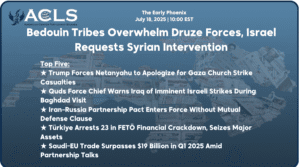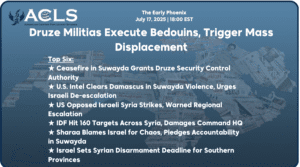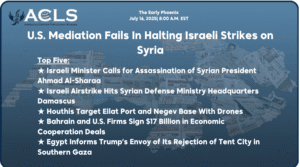Executive Summary
Russia’s Geopolitical Influence Grows in Africa: Sudan and Niger Showcase Expanding Reach
Recent developments emphasize Russia’s heightened engagement in Sudan and Niger, underscoring its persistent pursuit of geopolitical influence in Africa. In Sudan, where political resolutions encounter hurdles, the exposure of Russia’s ties to the Wagner Group and gold smuggling continues to impact ongoing conflicts. Simultaneously, Moscow-backed coup efforts in Niger challenged French interests, reflecting Putin’s ambitions to shape North and Central Africa’s geopolitical landscape. Experts assessing the armed groups supported by Russia highlight their relative weakness compared to ECOWAS, suggesting their claims of combat readiness alongside Nigerien putschists lack credibility. As France and ECOWAS navigate these challenges, the role of the United States becomes crucial in countering the escalating Russian impact on the continent.
Saudi Arabia Hosts Diplomatic Summit Amidst Russia’s Global Struggles
As Russia contends with setbacks in Ukraine and navigates complex African geopolitics, Saudi Arabia organized a summit engaging representatives from over 40 nations to address the Russian invasion of Ukraine. Notably excluding Russia, the conference demonstrated Saudi Arabia’s dedication to addressing intricate global challenges. While yielding limited concrete outcomes, the event showcased the kingdom’s proactive role in diplomacy, reinforcing its position as a critical player in intricate geopolitical scenarios.
North Africa Report: Russia’s Expanding Influence in Africa, Week’s Update Reveals Role in Sudan’s War and Niger’s Tensions
SUDAN:
Continued Failure of Political Initiatives in Resolving the Two Sudanese-Generals War: A Summit for Sudan Lacks Sudan’s Participation.
Against the backdrop of Sudan’s absence, neighboring nations convened to discuss the Sudanese conflict’s repercussions in Chad, underscoring the urgent need for international aid to support the influx of refugees. Amid the army and Rapid Support Forces conflict from mid-April to mid-July, Gezira State’s Ministry of Health witnessed a substantial influx of patients, totaling nearly half a million, seeking medical care across health affairs, hospitals, and health centers. This prolonged conflict cast a grim shadow over Sudan’s agricultural season, imperiling millions with famine. United Nations data exposed 6.3 million in food insecurity, while projections unveiled acute food shortages for over 20.3 million, constituting around 42% of the population.
In recent developments, Malik Agar, Vice President of the Transitional Sovereignty Council led by Fattah al-Burhan, traveled to Moscow, proposing a base in Sudan to Russia for assistance in mediating with the Rapid Support Commander or neutralizing the force. Previous reports, however, establish a direct connection between Yevgeny Prigozhin, the leader of Wagner, and Hemedti’s Rapid Support Forces, notably involving the smuggling of gold from Sudan to Moscow.
Amid ongoing clashes between the opposing sides, Sudanese artillery targeted Rapid Support Forces (RSF), while RSF surrounded the army’s General Command in an intelligence building. During a recent meeting with the leadership of the “Women Against War” Initiative, the vice president proposed a roadmap to end the conflict. The plan first involves separating the fighting forces, expediting humanitarian aid delivery, ensuring citizen safety, and initiating a political process based on state establishment rather than power sharing.
Meanwhile, Sudan’s army commander, Abdel Fattah Al-Burhan, established a committee to investigate “war crimes and violations of the Rapid Support Forces,” composed of officials from various sectors. The committee seeks to document alleged RSF violations since mid-April and pursue legal actions for crimes against humanity, war crimes, and potential genocide, particularly in West Darfur.
Notably, Russia’s Sputnik echoed a Sudanese expert’s perspective that both warring parties lacked the qualification to rule Sudan, emphasizing the necessity to remove them from the equation. The four-month conflict between the army and “rapid support” forces displaced 3 million internally. They led to a million refugees in neighboring countries, leaving the situation of Sudanese migrants in Tunisia ambiguous. Tragedy struck as over 30 migrants went missing after two iron boats sank off Italy’s coast, highlighting the dangerous Mediterranean migration route, which has seen 20,000 deaths or disappearances since 2014.
The Sudanese conflict between the army and “rapid support” forces has extended over four months, displacing 3 million internally and causing a million refugees in neighboring countries. Amidst a growing wave of racism against migrants, organizations overseeing refugee and migrant affairs in Tunisia remain silent. Although Sudanese migrants significantly populate Tunisia, their situation remains uncertain.
Tragedy struck as more than 30 migrants are missing after two boats, believed to be frail iron vessels, sank off Italy’s coast near Lampedusa Island. Survivors lost track of 28 individuals on one boat and three on the other. Departing from Sfax, Tunisia, Italian authorities are investigating the incident. The Mediterranean route connecting North Africa with Italy is the world’s most dangerous migration path, witnessing over 20,000 deaths or disappearances since 2014.
NIGER:
Defiant Nigerien Putschists Close Niger’s Airspace
Amid international pressure, defiant Nigerien putschists let their ultimatum lapse, rallying supporters in Niamey under the Russian flag, chanting anti-French slogans, and endorsing the coup. President Mohamed Bazoum’s plea in the Washington Post about his hostage status garnered little attention from the putschists. As the ECOWAS deadline expired, the military junta closed Niger’s airspace, accusing superpowers of preparing for aggression.
This week witnessed the departure of 65 Italian and ten American soldiers from Niger to Rome. Meanwhile, Algerian President Tebboune opposed military intervention while actively engaging with Russia. In a parallel vein, retired Libyan general Haftar affirmed his forces’ vigilance concerning neighboring tensions without declaring a clear position. However, intriguingly, the Nigerien coup leaders seemingly explored a contrasting path, purportedly seeking support from the Wagner Group. Chad and Burkina Faso also objected to military intervention in Niger.
France’s Defense Minister, Sebastien Lecorno, challenged the legitimacy of the coup, emphasizing recognition of acknowledged Nigerien authorities endorsed by ECOWAS and allied nations. Nevertheless, France faces intricate military choices due to its diminished presence contrasted with the substantial influence wielded by Russia. In reaction to the endorsement of the coup in Niger by militant groups in Burkina Faso and Mali, France declared this past weekend that it would suspend all assistance to these two nations.
The GULF:
Saudi Arabia Hosts Talks on Ukraine Conflict in Diplomatic Endeavor
Saudi Arabia has taken a bold step onto the international stage by hosting talks addressing the ongoing conflict in Ukraine. The discussions, held in the coastal city of Jeddah over the weekend, were part of Riyadh’s effort to play a diplomatic role in global affairs. However, expectations for a significant breakthrough in the Russian-Ukrainian conflict remain cautious.
The talks brought together representatives from approximately 40 countries, excluding Russia. While the meetings concluded without a final statement, their primary aim was to create an understanding of basic principles for ending the conflict. The discussions focused on a potential peace formula that would entail a return to Ukraine’s former borders, including Crimea, which was annexed by Russia in 2014.
Notably, Russia’s absence from the negotiations did not deter discussions about President Vladimir Putin’s potential stance on critical issues such as cease-fires or peace deals. The talks also sought to involve crucial countries, including members of the “BRICS” bloc like China, India, and Brazil, which have adopted more neutral positions on the war.
China participated through its envoy to Ukraine, Li Hui, affirming the nation’s commitment to a constructive role in resolving the Ukrainian crisis. India, South Africa, and Brazil also sent officials, with Brazil emphasizing the importance of including all relevant parties in negotiations, including Russia.
The diplomatic initiative underscores Saudi Arabia’s aspiration to enhance its role as a global mediator. Experts note that Riyadh’s diplomatic strategy centers on maintaining strategic relations with Ukraine and Russia, leveraging its position to mediate conflicts and bolster its international image.
While the ultimate outcome of the talks remains uncertain, Saudi Arabia’s multifaceted approach to diplomacy highlights its determination to contribute to conflict resolution and regional stability. By hosting discussions on the Ukrainian conflict, Saudi Arabia positions itself as a potential key player in navigating complex geopolitical landscapes and promoting global peace.



